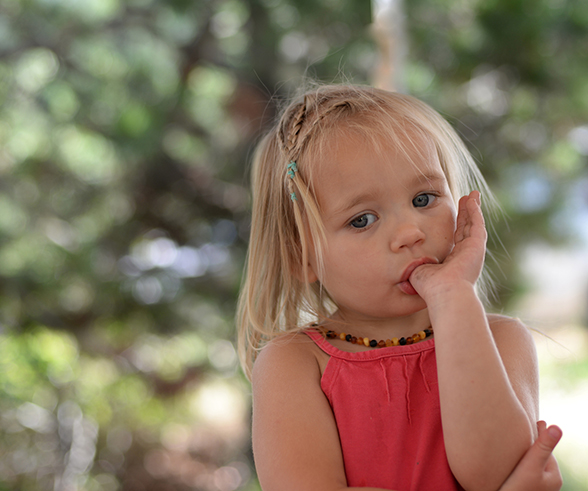Maggie Dent on boys: Five childhood stages parents need to understand

Maggie Dent is a parenting educator and a regular guest on Feed Play Love.
So often, as parents we find ourselves asking: What’s happening with my boy?
Over my many years of working with parents and educators of boys, I’ve noticed that there are some questions that tend to be asked repeatedly at various stages of boyhood.
In a way, there are some developmental windows that can be trickier than others and, with a little bit of understanding, we can all appreciate that our little boys and our adolescent boys are often responding to significant, invisible changes happening within them.
Remember, this is not ALL boys, however, it’s fairly accurate to say this applies to most boys.
Statistically, our little boys’ survival before the age of one is more at risk than our little girls’. Boys tend to die prenatally, at birth and in the first 12 months of life at a higher rate than girls — it’s not a huge difference however it is statistically significant.
Male vulnerability in terms of health and wellbeing has now been well researched. This research continues to bring forward evidence that little girls develop faster and more thoroughly than little boys from conception.
Even before I became a mother of my four awesome sons, I had spent much of my childhood with my little brother who was much gentler and often less brave than me.
Maybe this helped me to realise that boys are not inherently tough even though they have a larger amount of muscle than girls. Physical strength is one thing, but mental and emotional strength that can impact cognitive abilities, especially good decision-making and linguistic capacities, is something else.
Despite these early differences for a significant number of little boys, the first tricky window of boyhood is toddlerhood. 1.
Toddlers
All toddlers are biologically wired to become scientists, adventurers and explorers using all their senses to try and discover how the world works. And boy toddlers with their extra energy and physical strength can be really exhausting.
They seem to launch off our laps into the physical world quite suddenly. All toddlers want to move and explore. However, boys have an additional hunger to touch everything or to tap everything with other objects and toys! Oh, and don’t forget the pushing, the jumping and the need to run as far away from parents as possible when given any freedom!
Listen to Maggie on Feed Play Love:
Many boys become mountain climbers in their toddler years and you can find them on the top of all sorts of places you wish they’d never climbed. Please ensure that all your chests of drawers are fastened to the wall behind to ensure they will not topple on top of our toddler boys.
When they smear their food all over the wall this too does not have to be seen as bad or wrong, but merely that your sons are using their senses to find meaning in their world. When they use a permanent marker to draw you a beautiful picture on the wall or on your dog — again they are not wrong or bad. Their intention was from a place of love and they were using their seeking mechanism in the way that Mother Nature intended. Keep in mind the 4 Steps to Toddler Genius … developmentally normal and a stage that passes.
2. Fierce and busy fours
Often around four years of age, boys can appear to become more ‘badly behaved’, less responsive to parental guidance and incredibly energetic physically. Over the years, I have noticed how many mums have turned to me in desperation in this window — particularly for their rooster sons — because nothing seems to be working with their fierce, busy and very active four-year-old.
By four, boys simply have more muscle and thus physical strength, and a hunger to channel their inner biological drives into becoming warriors or ‘mammoth hunters’.
Another possible explanation for this change in behaviour in a significant number of our boys is due to some shifts in hormonal activity, particularly the luteinising hormone which directs their testes to start making Leydig cells. These interesting little characters lie hidden deep in our little boy’s body to play a much bigger role when puberty begins; however, this hormonal shift, whether directly or indirectly, can contribute in some way to this change at this age.
Steve Biddulph explores this and what he calls “the full-on fours” in more depth in his updated version of his classic book, Raising Boys, called Raising Boys in the 21st Century. It is a must-read for all parents of boys.
From my observations, I have found many four-year-old boys still struggle with verbal communication and they tend to respond through physical action. This is why I often say that “boys behaviour is their language”. Regardless of the reason for this increase in energy and the need for activity, boys from four to six often need a lot more freedom to move, plenty of space to move, lots of opportunities to be adventurous and brave, and to have moments where they are autonomous and able to make their own choices — even if they cause them physical pain.
This window does close. However, trying to contain little boys who need to be navigating their worlds with energetic action, enthusiasm and very little thought, can be where we can unintentionally damage our boys and how they see themselves.
Mums can find this really difficult because it can be exhausting and frustrating to keep the balance between being a ‘mean’ and ‘loving’ mum. Dads can get frustrated too, but they tend to appreciate the need for physical freedom a bit more than mums.
Enough parental guidance to keep them alive versus enough freedom to allow them to seize authentic moments of joy and delight that make them glad to be alive is the key here.
If you are lucky enough to have a backyard, fill it with balls of all sizes, bats, ropes and the biggest sandpit you can fit, and allow your son and his little mates to run wild and free. Yes, they will often do this naked on cold days — please resist your natural mummy instincts to bring them inside to get them warm and dressed. Trust me, they will come in when they are ready.
Let me repeat again: this highly energetic and frustrating phase of your son’s life does pass. There were many times when I was taking the Dent boys somewhere in public that I was really conscious of ‘running the gunk out of their motor’. Essentially this meant I wanted to give the boys time and space to be as physically vigorous as they needed to be before we went somewhere where this was going to be impossible.
Given that many of our young boys are spending more hours on digital devices than outside running wild and free, it is understandable that we are starting to see higher numbers of boys being suspended and expelled when they are four to six years of age.
So please keep your four-year-old and older sons as physically active as possible in the real world, hopefully playing with other children, and know this hunger for physicality settles in time. Also, know that growing self-regulation can take more time in boys than our little girls. Be careful not to drown our little ‘mammoth hunters’ with too many ‘NOs’ or serious reprimands as so often they are not acting intentionally wilful. They are wired to do and think later. Your mantra for this age may be “what was he thinking?”
With constant, warm guidance and correction, and bucket loads of patience, little boys can get better at making decisions that cause their parents less frustration and stress.
Keep a hidden supply of good chocolate too and know that you may need more coffee/tea — however, this too will pass.

3. Sensitive eight-year-olds
When I was counselling full-time I met a number of little boys around the age of eight who had suddenly become emotionally very sensitive and even fragile, despite having not being like that before.
For some boys, this shift seemed completely out of character. I have had parents tell me that when their eight-year-old son has disappointed himself with a spelling test or has not managed to climb a tree the way he had planned, he has collapsed tearfully with intense self-loathing and despair: “I am useless!” “I am hopeless!” Even more desperately some young eight-year-old boys have expressed that they wish they could die! This is incredibly distressing and frightening for parents and teachers to hear these powerful sad words.
It is important in this tricky window (indeed, always but particularly during this time of sensitivity) to avoid telling boys to ‘toughen up’, to stop ‘being weak’ and other shame-based phrases.
This kind of talk can teach boys that vulnerability is something to fear, hide and avoid at all costs.
It has only been in recent times that a possible reason for this shift around the age of eight has been discovered with research. Again, Steve Biddulph writes about this in his new book, but according to a long-term study of 1,200 boys at Melbourne’s Murdoch Institute, it’s a hormonal stage called adrenarche that makes boys struggle emotionally around this age. It seems that this is a very early preparation for puberty.
Being a supportive and reassuring grown-up for our boys during this tricky stage is incredibly important. If you are really concerned that it is beyond simple biology please trust your parental instincts and go and have a chat with your family GP. For the vast majority of young lads, they will return to their usual selves for a couple of years before the full onset of puberty. Enjoy this window of stability and almost normality!

4. Puberty (12 years old and up)
This tricky, visible window of development is one that has been happening since time began and so, in many ways, parents are expecting this time of challenge. Even though there will be increasing surges of testosterone — up to an 800% increase from toddlerhood — puberty needs to be seen as a time of incredible transformation and change, not just a time to dread.
Puberty brings changes physically, cognitively, emotionally, socially and hormonally — and so we really need to be mindful that all these changes happening at the same time can cause our tween and teen boys lots of stress.
Pubescent boys tend to be all arms and legs, ungainly and awkward, and always hungry!
I thoroughly enjoyed teaching high school students and having a house full of adolescents because when they feel safe and valued, they can be a joy to be around. They can be so funny and spontaneous, and refreshingly real. I would love to know how many thousand loaves of bread we purchased over those 10 years!
When the brain pruning does happen in early adolescence it can seem like an alien has stolen your beautiful boy and he will become more forgetful, more disorganised, moodier, grumpier and seemingly insensitive to the world around him. All of this is completely normal and it is well beyond his control to “snap out of it” or to “be the more thoughtful!”
It is a completely confusing journey of change and up to 15 is a time of incredible vulnerability for our boys particularly, mainly because they have been conditioned not to share their vulnerable emotions and fears with anyone.
Your son will need you to lovingly and warmly remind him to maintain his personal hygiene — yes it seems they can’t smell their body odours! Their penis can be incredibly unreliable and badly behaved, and for some of our lads, the brain pruning can accidentally prune their capacity to speak articulately. So the mumbling and the one-word responses that sound like he has his head in a paper bag can be something that causes him just as much angst as it causes you. Please avoid telling your mumbling son to open his mouth – it is a brain change that has caused this and around 18 his previous capacity of being able to speak in sentences fairly clearly will return.
Boys are susceptible to becoming addicted in this vulnerable window up to around 16, to all sorts of temptations that are available in our world — gaming, pornography, smoking, alcohol, and other legal and illicit drugs.
Michael Gurian argues that our boys are particularly susceptible to becoming lost on the journey to manhood.
These couple of years can be really tough on mums who had a great relationship with their pre-teen boy — you can really miss him.
He will gradually start reconnecting to you around 16-17 as the later stages of puberty kick in. Be compassionately patient and know that a well-timed small unexpected fart close beside your son can be a loving, bonding gesture for a boy in this tricky window!
There is no question that boys who have significant grown-ups who care about them and value them, no matter how many mistakes they make, tend to move through adolescence with less conflict and challenge.
5. Young adults
The last tricky window for parents to understand is the stage at which our boys become legal adults — the launching pad into a fully adult life. Research has shown us that boys tend to, again, be a little slower than girls to be ready for this leap into the real world. Indeed, with boys that have been raised in a screen world, this transition point in being ready to manage their lives seems to have stretched out even further into the early 20s.
We need to be clear that the final growth of our mature brain — the prefrontal cortex — has been shown not to be complete for our girls until around 22 to 24 and our boys anytime from 25 onwards.
For those lads who have spent endless hours gaming, rather than participating in the real world with real people, their arrival at this launch point may be something they are underprepared for.
Building these vital life skills, both before and during the teen years, is incredibly helpful. I hear from many parents who have an incredibly unmotivated 18-year-old boy who is lounging around their house lost and appearing lazy.
Indeed, he is lost. However, his lack of motivation is partly developmental and he will need tiny steps of encouragement to see him move towards a more positive outcome.
Shouting, criticising and shaming him for being unmotivated will make him retreat further. He is terrified of failure and doing nothing is a way to avoid failing. Many of these lads turn to alcohol or serious risk-taking behaviour to soothe their sense of inadequacy and separation from friends that often occurs after high school finishes.
Warm, loving parenting
Essentially, each one of these tricky windows in your son’s journey from babyhood to manhood needs exactly the same warm, loving support from caring parents and educators.
The challenge is not to see that there is something wrong with our boys during these tricky windows but seeing that they are experiencing a new developmentally driven challenge that we need to help them overcome until this stage passes.
Building resilience in our children from early in their lives can be incredibly helpful for each of these tricky stages.
One of the most important things that will help your young lads through these tricky stages of life is to ensure that they have a clear predictable structure with constant, gentle reminders of our expectations of them.
We need to keep affirming the basic three rules: please try not to hurt yourself, or others, or the world around you. And we need to keep affirming to them that each of these tricky stages of development will pass.
Constantly reaffirming your unconditional love for your son when he has his muck-up moments will help him enormously when the world becomes uncertain and confusing.
So often our young lads need our love and encouragement when they appear to deserve it the least.
Of course, life can throw us unexpected moments of significant adversity that can tip our boys into a world of emotional turmoil with few tools to manage.
This includes the end of his parents’ relationship, death, a natural disaster, serious illness or accident, a broken heart or significant bullying that is threatening their sense of safety in the world.
Every child needs to have a safe grown-up that they can turn to — a lighthouse figure who will always hold a welcoming and safe space for them while the turmoil can rage around them.
Traditionally boys have been less forthcoming at seeking help from others when they are feeling vulnerable and we need to change this so that we can have more of our beautiful boys grow up to be healthy, happy loving men.
So, rather than blaming our boys for being a little more difficult to live with during these tricky times, maybe we need to blame Mother Nature or evolution because underneath each of these stages is an incredibly important growth and development that needs to occur.
Every gesture of kindness will make a difference to boys in each of these tricky stages.
This article was originally published on Kinderling Kids Radio from Maggie’s blog at maggiedent.com. Download the Kinderling app for more great stories.









